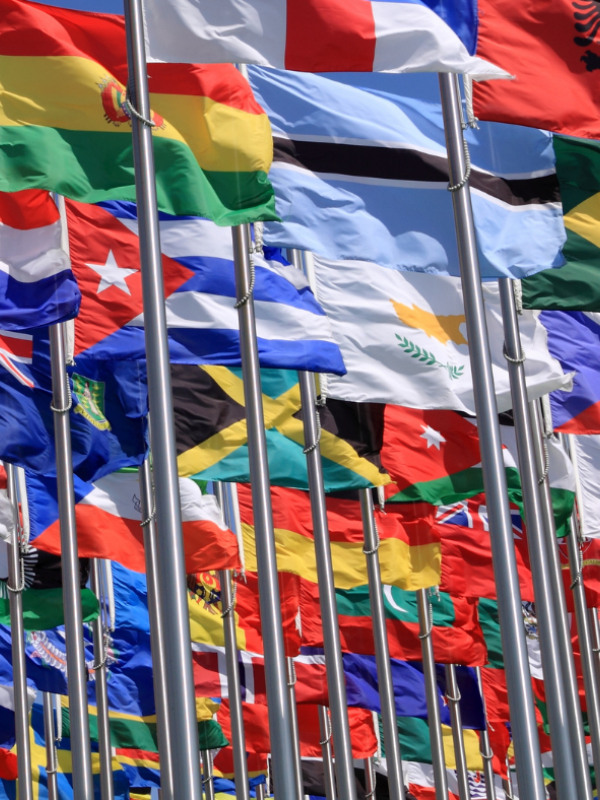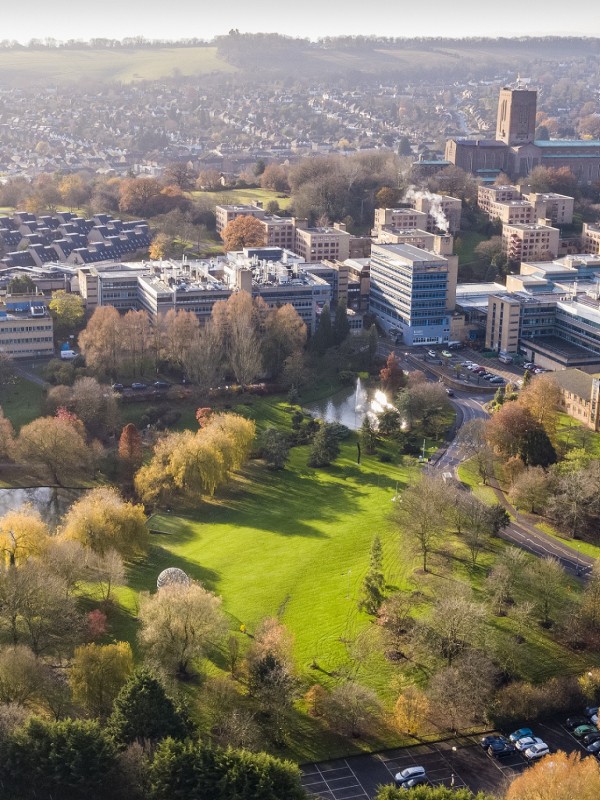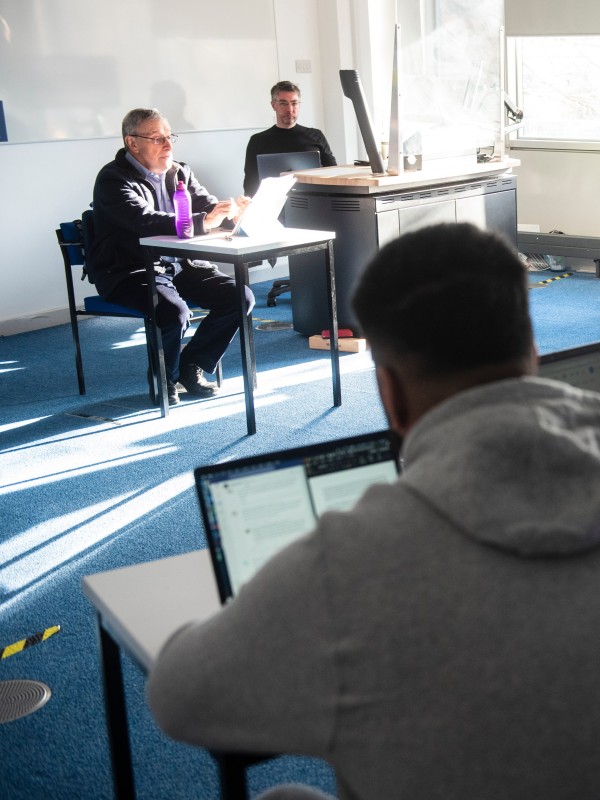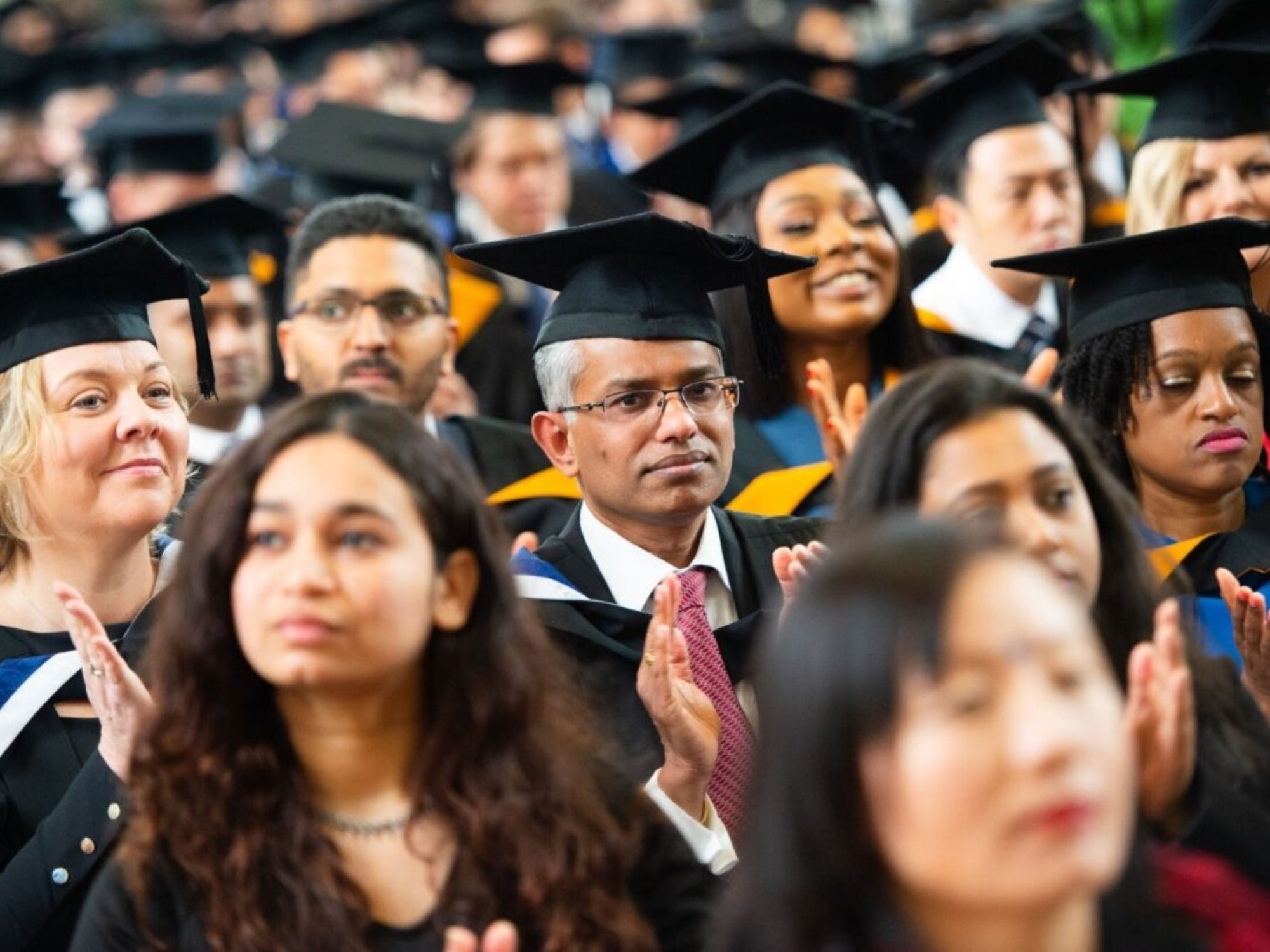
- International Relations (International Intervention)
MSc — 2025 entry International Relations (International Intervention)
Develop a deeper understanding of global issues in an intriguing area of ethical, legal, political and economic challenges posed by international intervention. Along with having the option of a placement, you'll develop a wide range of transferable skills to kick-start your career.
Why choose
this course?
- International organisations, humanitarian agencies and states all intervene in the sovereign affairs of nation-states. But when might such intervention be justified and how can it be made most effective?
- Hosted in our Centre for International Intervention, our International Relations (International Intervention) MSc draws upon our staff's decades of experience in the diplomatic and humanitarian sectors. Crisis management and negotiation simulations enable you to apply the conceptual challenges presented by intervention in practical contexts.
- With the option of a Professional Training placement, the International Intervention pathway will enable you to tackle the ethical, legal and political challenges posed by international intervention.
Statistics
Fantastic graduate prospects
100% of our Politics postgraduate students go on to employment or further study (Graduate Outcomes 2024, HESA)
Impressive earnings potential
Our Politics and International Relations postgraduate students take home an average salary of £48,043 (Graduate Outcomes 2024, HESA)
Research Excellence Framework (REF) 2021
We are ranked in the top 20 for the quality of our research outputs
What you will study
You’ll study modules covering the latest research on international intervention and post-conflict processes, uniquely co-taught by experienced practitioners alongside the Centre for International Intervention’s academic experts.
On our International Interventions pathway, you will engage in critical debates on the nature of international intervention. You will be taught via discussion-seminars and simulation-based learning to investigate issues of state sovereignty, human rights and the responsibility to protect people from atrocities.
This masters programme also offers students the option of taking a Professional Training placement, allowing you to spend three months gaining vital industry-relevant experience. These will significantly enhance your employment opportunities upon graduation.
Past students have worked in diplomacy and foreign affairs, the military, charities and humanitarian NGOs, think tanks and international organisations.
The structure of our programmes follows clear educational aims that are tailored to each programme. These are all outlined in the programme specifications which include further details such as the learning outcomes:
Modules
Modules listed are indicative, reflecting the information available at the time of publication. Modules are subject to teaching availability, student demand and/or class size caps.
The University operates a credit framework for all taught programmes based on a 15-credit tariff, meaning all modules are comprised of multiples of 15 credits, up to a maximum of 120 credits.
Course options
Year 1
Semester 1
Compulsory
This module will provide an introduction to the design and conduct of social science research. Throughout, examples will be drawn from recent research in the areas of politics and policy. However, emphasis will also be placed on the applicability of these methods to other subject areas across the social sciences.
View full module detailsThe module will examine, from a historical and practice-based perspective, international intervention in response humanitarian crisis, abuses of human rights, state failure, and armed conflict. Students will engage the historical cases of international intervention, to understand why, when, and how intervention talks place in practice. A UN Security Council simulation provides students with the experience of negotiating a resolution for intervention in the context of an evolving humanitarian crisis. Students also benefit from experienced practitioner engagement and a career-focused session.
View full module detailsThis module covers the main ethical, legal, and theoretical issues arising from practices of international intervention. In doing so, it brings together and integrates different subfields from the social sciences and humanities, ranging from IR theory and law to ethics and political theory.
View full module detailsOptional
The module explores a range of theoretical approaches to study of International Relations thus introducing students to different ways current trends in the international system. The module will follow a historiographical approach thus starting with the “classical debates in IR theories, then moving on to mainstream debates and concluding with critical approaches.
View full module detailsThis module introduces students to one of the sub-disciplines of International Relations, Foreign Policy Analysis and explore the world of public diplomacy. Studying a variety of actors in world politics, students will be encouraged to apply the insights of Foreign Policy Analysis to improve their understanding of contemporary international relations and public diplomacy issues.
View full module detailsWhat is international order in the twenty first century? A few short decades have transformed the planet in ways that are only just being understood. A satellite image of the sky at night reveals coastal mega¿cities and inland urban corridors of unprecedented size and scope: new global city networks, mega-city regions and urban corridors have emerged that bring into question traditional state-centric notions of global politics. Alongside and through these urban patterns run other large technical systems: huge materially integrated physical structures: transport systems, supply chains, air travel networks, submarine Internet cables, satellites, research labs. Onto these systems now map planetary-scaled technologies of computation, generating a new mega-structure comprising smart grids, cloud computing platforms, and sensor nets. This is world order in the twenty first century. Conflict over these infrastructures is part of geopolitical competition and international order building today. This module builds on cutting edge social theory to introduce students to new ideas about how political order is built at multiple scales. It examines the ways in which China is using infrastructure investment to reshape the Eurasian political and economic order via its Belt and Road Initiative, and how the EU and the US are responding. It examines how global city networks are setting their own global governance agendas, often in parallel to states. It offers new perspectives on the infrastructural dark matter that holds international orders together, and allows them to endure across time and space.
View full module detailsSemester 2
Compulsory
This module will introduce students to quantitative research methods, with particular focus on current examples from politics in general and International Relations and Public Affairs in particular. In this module students will be introduced to the basic concepts, methods, and techniques used in quantitative analysis and are necessary for understanding developments in politics and decisions taken by the government and other public organisations. This module will also provide students with the skills necessary and the practical experience of using quantitative data and techniques of analysing it. This way students will learn new in-demand skills, not only for their studies but also skills they can highlight in their CVs. The course uses the statistical software RStudio, and you will learn how to critical evaluate research questions by using them most important surveys available. Students will also learn skills they can apply at their dissertation and placement reports. It is a direct follow up on material acquired in POLM009 but focusing on skills and quantitative analysis
View full module detailsThe module examines armed conflict, civil war in particular, and international peacebuilding interventions. It draws on the multidisciplinary literature in Conflict and Peace Studies. Throughout the course students will become familiar with key actors, policies and institutions involved in conflict and post-conflict environments.
View full module detailsOptional
This module provides students with both a theoretical and practical understanding of International Trade, considered from an international political economy (IPE) as well as management perspectives. This is done through the assessment of International Trade from different angles, predominantly from the international trade management view, the international trade operations dimension, the state’s perspective, from the international trade regime perspective (the GATT and WTO) but also from the perspective of the international society, regional cooperation and the perspective of business and industry.
View full module detailsThe module offers an introduction to the major theoretical and empirical debates that structure two subdisciplines: Critical Security Studies and Critical Terrorism Studies. In the first half, the module is organised around core questions in Critical Security Studies, such as: what is security; security for whom of for what; security from whom or from what; how should security be achieved; and is security possible? In the second half, the module is organised around similar core questions in Critical Terrorism Studies.
View full module detailsThe module provides an opportunity for students to apply their understanding of key theories and debates in International Political Economy (IPE) to current developments and case studies. Students will be able to discuss and debate the role of the main IPE institutions. Current and future challenges to the status quo of IPE are discussed as well.
View full module detailsThe module expands and develops upon the key issues in international security and defence. Beginning by providing a background to the study of security and defence, the module introduces theoretical perspectives into contemporary themes in security and defence, as well as their inter-relation. The module also examines various security and defence actors ranging from international, regional and sub-regional organisations to NGOs and private military companies. Through readings from diverse scholarly and cultural backgrounds, individual and group work, and in-class simulations, students actively and critically engage with issues including, but not limited to, humanitarian intervention, nuclear deterrence, the role of gender in conflict, and African peace and security architecture.
View full module detailsSince the US anti-Vietnam War movement, philosophical interest in armed conflict has increased considerably. Beginning with Michael Walzer's classic Just and Unjust Wars: A Moral Argument with Historical Illustrations (1977), this module looks at key thinkers, themes, and ideas from contemporary just war theory and the ethics of armed conflict, mostly from within the analytical tradition of philosophy. Topics include the paradigm of self-defense and its critics, the moral status of combatants, the normative sources (and limits) of non-combatant immunity, the moral nature of terrorism, as well as the problem of intervention. The module concludes by examining more recent ethical challenges posed by remote-warfare, cyber warfare, and the prospect of robotic weapons. In studying these topics, students will not only gain a sound understanding of contemporary just war theory; they will also be introduced to key ideas and concepts from contemporary ethical and political theory. Finally, students will be able to apply the more abstract philosophical material discussed on the module to real-life events via an assessed Ethics Case Study.
View full module detailsSemester 1 & 2
Compulsory
The dissertation is an extended piece of writing (10,000-15,000 words) which allows the student to work on a topic independently in depth with appropriate guidance from a supervisor. It enables students to specialise in an aspect of the taught programme which is of particular interest and to synthesise the skills and knowledge which they have acquired.
View full module detailsOptional
This module supports the student’s evaluation of, and learning from, their Postgraduate Placement. Learning will occur during and/or after placement.
View full module detailsOptional modules for Year 1 (full-time) - FHEQ Level 7
Choose three optional modules
Year 1
Semester 1
Compulsory
This module will provide an introduction to the design and conduct of social science research. Throughout, examples will be drawn from recent research in the areas of politics and policy. However, emphasis will also be placed on the applicability of these methods to other subject areas across the social sciences.
View full module detailsThe module will examine, from a historical and practice-based perspective, international intervention in response humanitarian crisis, abuses of human rights, state failure, and armed conflict. Students will engage the historical cases of international intervention, to understand why, when, and how intervention talks place in practice. A UN Security Council simulation provides students with the experience of negotiating a resolution for intervention in the context of an evolving humanitarian crisis. Students also benefit from experienced practitioner engagement and a career-focused session.
View full module detailsSemester 2
Compulsory
This module will introduce students to quantitative research methods, with particular focus on current examples from politics in general and International Relations and Public Affairs in particular. In this module students will be introduced to the basic concepts, methods, and techniques used in quantitative analysis and are necessary for understanding developments in politics and decisions taken by the government and other public organisations. This module will also provide students with the skills necessary and the practical experience of using quantitative data and techniques of analysing it. This way students will learn new in-demand skills, not only for their studies but also skills they can highlight in their CVs. The course uses the statistical software RStudio, and you will learn how to critical evaluate research questions by using them most important surveys available. Students will also learn skills they can apply at their dissertation and placement reports. It is a direct follow up on material acquired in POLM009 but focusing on skills and quantitative analysis
View full module detailsThe module examines armed conflict, civil war in particular, and international peacebuilding interventions. It draws on the multidisciplinary literature in Conflict and Peace Studies. Throughout the course students will become familiar with key actors, policies and institutions involved in conflict and post-conflict environments.
View full module detailsOptional modules for Year 1 (part-time) - FHEQ Level 7
Two compulsory modules in Semester 1 - Two compulsory modules in Semester 2
Year 2
Semester 1
Compulsory
This module covers the main ethical, legal, and theoretical issues arising from practices of international intervention. In doing so, it brings together and integrates different subfields from the social sciences and humanities, ranging from IR theory and law to ethics and political theory.
View full module detailsOptional
The module explores a range of theoretical approaches to study of International Relations thus introducing students to different ways current trends in the international system. The module will follow a historiographical approach thus starting with the “classical debates in IR theories, then moving on to mainstream debates and concluding with critical approaches.
View full module detailsThis module introduces students to one of the sub-disciplines of International Relations, Foreign Policy Analysis and explore the world of public diplomacy. Studying a variety of actors in world politics, students will be encouraged to apply the insights of Foreign Policy Analysis to improve their understanding of contemporary international relations and public diplomacy issues.
View full module detailsWhat is international order in the twenty first century? A few short decades have transformed the planet in ways that are only just being understood. A satellite image of the sky at night reveals coastal mega¿cities and inland urban corridors of unprecedented size and scope: new global city networks, mega-city regions and urban corridors have emerged that bring into question traditional state-centric notions of global politics. Alongside and through these urban patterns run other large technical systems: huge materially integrated physical structures: transport systems, supply chains, air travel networks, submarine Internet cables, satellites, research labs. Onto these systems now map planetary-scaled technologies of computation, generating a new mega-structure comprising smart grids, cloud computing platforms, and sensor nets. This is world order in the twenty first century. Conflict over these infrastructures is part of geopolitical competition and international order building today. This module builds on cutting edge social theory to introduce students to new ideas about how political order is built at multiple scales. It examines the ways in which China is using infrastructure investment to reshape the Eurasian political and economic order via its Belt and Road Initiative, and how the EU and the US are responding. It examines how global city networks are setting their own global governance agendas, often in parallel to states. It offers new perspectives on the infrastructural dark matter that holds international orders together, and allows them to endure across time and space.
View full module detailsSemester 2
Optional
This module provides students with both a theoretical and practical understanding of International Trade, considered from an international political economy (IPE) as well as management perspectives. This is done through the assessment of International Trade from different angles, predominantly from the international trade management view, the international trade operations dimension, the state’s perspective, from the international trade regime perspective (the GATT and WTO) but also from the perspective of the international society, regional cooperation and the perspective of business and industry.
View full module detailsThe module expands and develops upon the key issues in international security and defence. Beginning by providing a background to the study of security and defence, the module introduces theoretical perspectives into contemporary themes in security and defence, as well as their inter-relation. The module also examines various security and defence actors ranging from international, regional and sub-regional organisations to NGOs and private military companies. Through readings from diverse scholarly and cultural backgrounds, individual and group work, and in-class simulations, students actively and critically engage with issues including, but not limited to, humanitarian intervention, nuclear deterrence, the role of gender in conflict, and African peace and security architecture.
View full module detailsThe module provides an opportunity for students to apply their understanding of key theories and debates in International Political Economy (IPE) to current developments and case studies. Students will be able to discuss and debate the role of the main IPE institutions. Current and future challenges to the status quo of IPE are discussed as well.
View full module detailsThe module offers an introduction to the major theoretical and empirical debates that structure two subdisciplines: Critical Security Studies and Critical Terrorism Studies. In the first half, the module is organised around core questions in Critical Security Studies, such as: what is security; security for whom of for what; security from whom or from what; how should security be achieved; and is security possible? In the second half, the module is organised around similar core questions in Critical Terrorism Studies.
View full module detailsSince the US anti-Vietnam War movement, philosophical interest in armed conflict has increased considerably. Beginning with Michael Walzer's classic Just and Unjust Wars: A Moral Argument with Historical Illustrations (1977), this module looks at key thinkers, themes, and ideas from contemporary just war theory and the ethics of armed conflict, mostly from within the analytical tradition of philosophy. Topics include the paradigm of self-defense and its critics, the moral status of combatants, the normative sources (and limits) of non-combatant immunity, the moral nature of terrorism, as well as the problem of intervention. The module concludes by examining more recent ethical challenges posed by remote-warfare, cyber warfare, and the prospect of robotic weapons. In studying these topics, students will not only gain a sound understanding of contemporary just war theory; they will also be introduced to key ideas and concepts from contemporary ethical and political theory. Finally, students will be able to apply the more abstract philosophical material discussed on the module to real-life events via an assessed Ethics Case Study.
View full module detailsSemester 1 & 2
Compulsory
The dissertation is an extended piece of writing (10,000-15,000 words) which allows the student to work on a topic independently in depth with appropriate guidance from a supervisor. It enables students to specialise in an aspect of the taught programme which is of particular interest and to synthesise the skills and knowledge which they have acquired.
View full module detailsOptional
This module supports the student’s evaluation of, and learning from, their Postgraduate Placement. Learning will occur during and/or after placement.
View full module detailsOptional modules for Year 2 (part-time) - FHEQ Level 7
One compulsory module in Semester 1 plus one option - Two optional modules in Semester 2 - Dissertation by end of programme
General course information
Contact hours
Contact hours can vary across our modules. Full details of the contact hours for each module are available from the University of Surrey's module catalogue. See the modules section for more information.
Timetable
Course timetables are normally available one month before the start of the semester.
New students will receive their personalised timetable in Welcome Week, and in subsequent semesters, two weeks prior to the start of semester.
Please note that while we make every effort to ensure that timetables are as student-friendly as possible, scheduled teaching can take place on any day of the week (Monday – Friday). Wednesday afternoons are normally reserved for sports and cultural activities. Part-time classes are normally scheduled on one or two days per week, details of which can be obtained from Academic Administration.
Location
This course is based at Stag Hill campus. Stag Hill is the University's main campus and where the majority of our courses are taught.
We offer careers information, advice and guidance to all students whilst studying with us, which is extended to our alumni for three years after leaving the University.
Whatever your plans, our MSc in International Relations (International Intervention) is a great stepping stone in your career development.
The International Intervention pathway offers you an excellent opportunity to develop a wide range of transferable skills and build personal networks.
Politics students have gone on to a wide range of careers. These include working for:
- International organisations
- National and local government
- Lobby groups
- Non-governmental organisations
- Private businesses
- Media organisations.
Beatriz Aguilar Soto
Student - International Relations (International Intervention) MSc
"To this day, I am very grateful to have chosen Surrey: a place to grow personally and professionally."
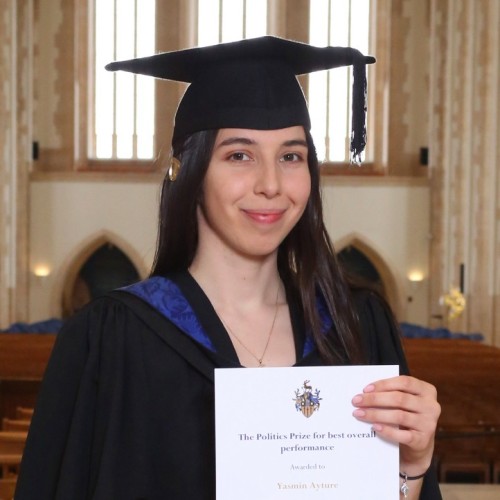
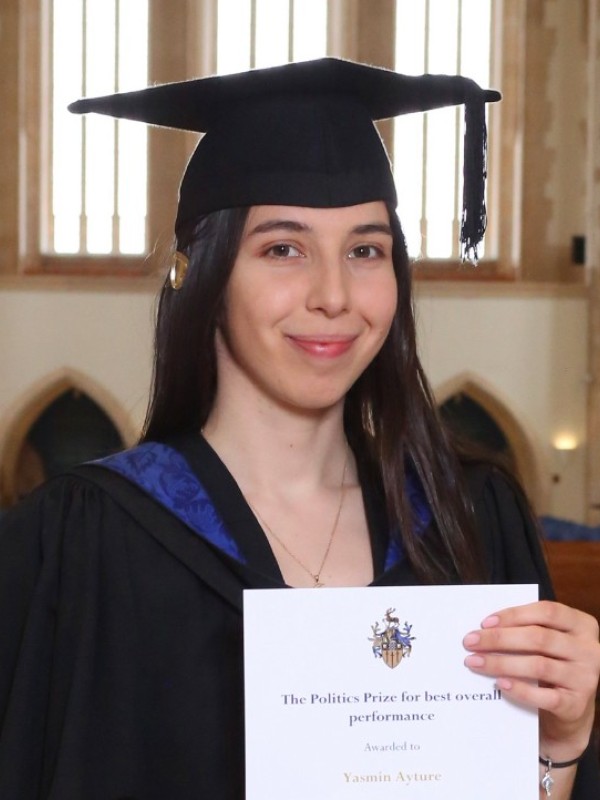
Yasmin Aytüre
Graduate - International Relations (International Intervention) MSc
"The people I met at Surrey both by living with them in halls, meeting them at societies, or on my degree programmes, including lecturers and staff, have played such an incomprehensible part of my life. My years spent in Guildford and at Surrey will be deeply etched in me for all of my life to come, and I cannot express my gratitude enough. #ForeverSurrey."
UK qualifications
A minimum of a 2:2 UK honours degree in:
- Area studies (Asian studies, European studies etc.)
- Business management
- Criminology
- Economics
- Gender studies
- Geography
- History
- Intercultural communication and translation
- International relations
- Journalism
- Law
- Philosophy
- Political psychology
- Politics
- Public administration
- Sociology
- Social psychology
- Women's studies.
Or a recognised equivalent international qualification.
We may be able to take relevant work experience into consideration if you don't meet these requirements.
If you have at least one year of relevant experience in a full-time graduate-level role (or a minimum of two years’ experience in a relevant graduate-level part-time role) please provide full details of your role and responsibilities in your personal statement and CV when you submit your application.
English language requirements
IELTS Academic: 6.5 overall with 6.0 in each element.
These are the English language qualifications and levels that we can accept.
If you do not currently meet the level required for your programme, we offer intensive pre-sessional English language courses, designed to take you to the level of English ability and skill required for your studies here.
Recognition of prior learning
We recognise that many students enter their course with valuable knowledge and skills developed through a range of ways.
If this applies to you, the recognition of prior learning process may mean you can join a course without the formal entry requirements, or at a point appropriate to your previous learning and experience.
There are restrictions for some courses and fees may be payable for certain claims. Please contact the Admissions team with any queries.
Placements
If you take a professional training placement, you will be based at your placement location in or outside the UK for those three months.
Scholarships and bursaries
Discover what scholarships and bursaries are available to support your studies.
Fees per year
Explore UKCISA’s website for more information if you are unsure whether you are a UK or overseas student. View the list of fees for all postgraduate courses.
September 2025 - Full-time - 1 year
- UK
- £10,900
- Overseas
- £21,800
September 2025 - Part-time - 2 years
- UK
- £5,500
- Overseas
- £10,900
- If you are on the two-year part-time masters programme, the annual fee is payable in Year 1 and Year 2 of the programme
- These fees apply to students commencing study in the academic year 2025-26 only. Fees for new starters are reviewed annually.
Payment schedule
- Students with Tuition Fee Loan: the Student Loans Company pay fees in line with their schedule (students on an unstructured self-paced part-time course are not eligible for a Tuition Fee Loan).
- Students without a Tuition Fee Loan: pay their fees either in full at the beginning of the programme or in two instalments as follows:
- 50% payable 10 days after the invoice date (expected to be October/November of each academic year)
- 50% in January of the same academic year.
- Students on part-time programmes where fees are paid on a modular basis: cannot pay fees by instalment.
- Sponsored students: must provide us with valid sponsorship information that covers the period of study.
The exact date(s) will be on invoices.
Funding
You may be able to borrow money to help pay your tuition fees and support you with your living costs. Find out more about postgraduate student finance.
Apply online
To apply online first select the course you'd like to apply for then log in.
Select your course
Choose the course option you wish to apply for.
Sign in
Create an account and sign into our application portal.
Please note that we may have to close applications before the stated deadline if we receive a high volume of suitable applications. We advise you to submit your application as soon as it is ready.
ApplyPlease note that we may have to close applications before the stated deadline if we receive a high volume of suitable applications. We advise you to submit your application as soon as it is ready.
ApplyAdmissions information
Once you apply, you can expect to hear back from us within 14 days. This might be with a decision on your application or with a request for further information.
Our code of practice for postgraduate admissions policy explains how the Admissions team considers applications and admits students. Read our postgraduate applicant guidance for more information on applying.
About the University of Surrey
Need more information?
Contact our Admissions team or talk to a current University of Surrey student online.
Terms and conditions
When you accept an offer to study at the University of Surrey, you are agreeing to follow our policies and procedures, student regulations, and terms and conditions.
We provide these terms and conditions in two stages:
- First when we make an offer.
- Second when students accept their offer and register to study with us (registration terms and conditions will vary depending on your course and academic year).
View our generic registration terms and conditions (PDF) for the 2024/25 academic year, as a guide on what to expect.
Disclaimer
This online prospectus has been published in advance of the academic year to which it applies.
Whilst we have done everything possible to ensure this information is accurate, some changes may happen between publishing and the start of the course.
It is important to check this website for any updates before you apply for a course with us. Read our full disclaimer.
